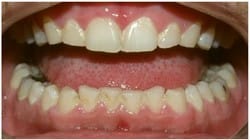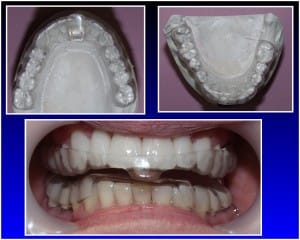|
Endodontic, or more commonly called “root canal” therapy, is a highly successful procedure – an overall 85% success rate. If the nerve and blood vessels inside your teeth, also known as the “pulp,” become infected, endodontic treatment can be used to save your tooth.
Endodontic procedures are usually needed if deep decay has progressed far enough that it infects the pulp chamber of your tooth, or if the tooth receives a blow or other severe trauma. The question Dr. Moorhead gets asked most about root canal therapy is one you’d probably expect: “Does it hurt?” We’ve all heard the stories told from years ago where someone had a root canal procedure performed and encountered lots of problems. Comedians and late night talk show hosts routinely refer to “root canals” as procedures to be avoided. But endodontic treatment has changed so much with today’s technology that it can’t even be compared to the stories people talk about. Endodontic treatment used to involve two to three appointments, and at the very least, the tooth was very sore. With the techniques we use in our office, at least 98% of endodontic procedures can be completed in just one appointment. Dr Moorhead routinely phones patients at night to make certain that they are doing well after their dental procedures. When hw phones our patients who have had a “root canal” earlier in the day, Dr. Moorhead routinely hear one of two responses – either the tooth feels “great,” or at worst, it’s “just a little tender to bite on.” That's quite a difference from what most patients expected! There are a couple of other things we do at Flemingsburg Dental Care to make certain our patients are comfortable during and after endodontic procedures. When necessary, Dr. Moorhead will prescribe an antibiotic in advance so that there aren’t any problems getting the patient numb. In addition, we routinely recommend that the patient take a non-steroidal anti-inflammatory medication, such as Aleve, one hour before the procedure, and for two to three days after the appointment. For patients who have always had problems getting numb or are highly anxious about their procedure, we use sedation dentistry. If you’ve been putting off root canal therapy, why not give us a call today? Click here for a special offer for new patients in our practice.
1 Comment
 This photo shows teeth shortened by bruxism. This photo shows teeth shortened by bruxism. Of the three causes for tooth loss, the one that surprises most people is excessive bite forces. The American Dental Association says that approximately one in three adults grind their teeth when they sleep. The condition, called bruxism, places unhealthy forces on teeth that can cause flattened or worn-down teeth, chipped areas at the gumline, loose teeth, and damages to your jaw joint. The most frequent causes of bruxism are stress and bite discrepancies. In a healthy bite, the teeth come together in harmony to protect the teeth and your jaw joint. That harmony can be lost when you have periodontal disease, tooth crowding, or missing teeth that have allowed the remaining teeth to shift or tilt. Even if your bite is perfect, stress can cause you to grind your teeth. Of people that are restless sleepers, 95% grind their teeth. The same brain activity that causes you to toss and turn also causes the bruxing. Let’s look at an example of bruxism. In the first photo, the teeth have already been shortened by at least one-fourth of their length. Often patients with problems even this severe are not aware that they are bruxing, and many will even deny it when shown the severity of the problem. And if your spouse sleeps more soundly that you, he or she may also be unaware of the problem. As a dentist, I hear patients make comments like “I sleep with my mouth open, so that can’t be happening.” Bruxing doesn’t occur constantly when you sleep, but if it’s happening, it still will cause damage. Below are some questions that may tell you a problem is present:
One treatment for bruxism is the use of a bite guard. A bite guard is a plastic appliance that fits over your teeth and protects them from damaged that’s caused by grinding. The kind of bite guards sold at the pharmacy can actually make things worse. Custom nightguards can be made that are extremely comfortable, and the newest designs, like the one shown here, actually have a relaxing effect on the muscles. If the arrangement of your teeth lacks harmony, there may be advantages to changing how your bite comes together. Orthodontic treatment (“braces”) can make dramatic changes, or your dentist can use a process called equilibration to reshape the biting surfaces of your teeth to improve the way they come together. Those in and around Fleming County, suffering from tooth grinding and other issues from Bruxism, should contact Dr. William Moorhead, at Flemingsburg Dental care. If you’re suffering headaches, or see tooth wear that you’re concerned about, give us a call at 888-733-3163. Your teeth and your mouth will thank you! |
Articles
All
AuthorDr. Moorhead and his team write about dental news, and answer patient questions. Archives |


 RSS Feed
RSS Feed